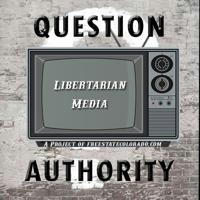
Libertarian Media - Video/Audio/Memes/Articles
Resource for Libertarian Media - Video - Pocasts - Memes - Articles
Більше- Підписники
- Перегляди допису
- ER - коефіцієнт залучення
Триває завантаження даних...
Триває завантаження даних...
CORY EFRAM DOCTOROW was born July 17, 1971 in Toronto, Canada. He attended alternative schools and worked at SF specialty store Bakka Books, but dropped out of high school at 17 and briefly moved t…
On the eve of the first presidential debate of 2024, the Supreme Court preemptively gave President Biden and his minions an implicit license to meddle in the election — by suppressing news and opinions they dislike. NY Post contributor James Bovard shares this story . Will the court’s refusal to stop federal censorship be a wooden stake in the credibility of American democracy? The court’s ruling came in the case of Murthy v. Missouri, brought by individuals who were censored on social media thanks to federal threats and machinations behind the scenes of companies like Facebook. Last year, in decisions that vividly chronicled a byzantine litany of anti-free speech interventions by multiple federal agencies and the White House, a federal district judge and a federal appeals court imposed injunctions that prohibited those officials from acting “to coerce or significantly encourage social-media companies to remove, delete, suppress, or reduce . . . posted social-media content containing protected free speech.” On Wednesday, in a 6-to-3 decision, the Supreme Court gave the benefit of the doubt to Washington’s browbeating, arm-twisting and jawboning of influential social-media companies — regardless of how many Americans are wrongfully muzzled. The Biden censorship industrial complex triumphed, it appeared, because most of the justices could not be bothered to honestly examine the massive evidence of its abuses. Read more at
https://nypost.com/2024/06/26/opinion/supreme-court-censorship-ruling-lets-biden-muzzle-us-online/#joebiden #supremecourt #censorship The New York Post is your source for breaking news, news about New York, sports, business, entertainment, opinion, real estate, culture, fashion, and more. Subscribe to New York Post Sports:
https://www.youtube.com/c/nypostsportsCatch the latest news here:
https://nypost.com/Follow The New York Post on: Twitter -
https://twitter.com/nypostFacebook -
https://www.facebook.com/NYPostBillionaires benefit greatly from their ventures, but so do other Americans.
Good schools come in many shapes and sizes.
The freedom philosophy has been a key part of many significant moments in history. Here are just a few examples.
На вашому тарифі доступна аналітика тільки для 5 каналів. Щоб отримати більше — оберіть інший тариф.
